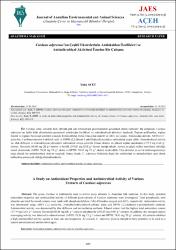A Study on Antioxidant Properties and Antimicrobial Activity of Various Extracts of Carduus adpressus
Access
Attribution 3.0 United Statesinfo:eu-repo/semantics/restrictedAccesshttp://creativecommons.org/licenses/by/3.0/us/Date
2019-12-15Access
Attribution 3.0 United Statesinfo:eu-repo/semantics/restrictedAccesshttp://creativecommons.org/licenses/by/3.0/us/Metadata
Show full item recordAbstract
The genus Carduus is traditionally used to relieve many ailments in Anatolian folk medicine. In this study, potential antioxidant properties and antimicrobial activity of different plant extracts of Carduus adpressus were investigated. Total polyphenols, total phenolic and total flavonoid contents were made with phosphomolybdate, Folin-Chiocalteu reagent and AlCl3, respectively. Antioxidant activity was determined using ABTS (2,2´-azino-bis, 3-ethylbenzothiazoline-6-sulfonic acid) and DPPH (2,2-diphenyl-1-picrilhydrazil) methods. Antimicrobial activity was determined by disc diffusion and microdilution methods. Ethanol extract had the highest total antioxidant content (377.9 mg GAE g-1 extract), flavonoid (60.06 mg QE g-1 extract) and phenolic (291.03 mg GAE g-1 extract). In addition, the strongest radical scavenging activity was detected in ethanol extract (ABTS: 78.26 mg TE g-1 extract and DPPH: 74.45 mg TE g-1 extract). All extracts exhibited a high antimicrobial activity against at least one microorganism. As a result, C. adpressus plant is thought to have potential to be used as a natural antioxidant and antimicrobial agent.
Collections
The following license files are associated with this item:



















